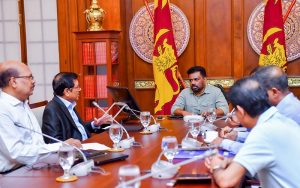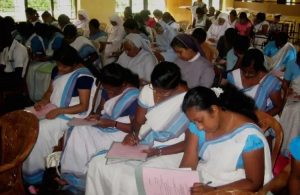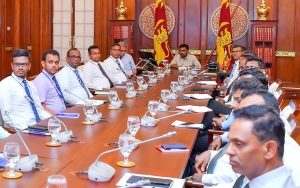Unemployment crisis of blind graduates worsens ( Sathya Nirmani )

The Government has stopped hiring graduates during the past three years and 75 blind graduates who graduated in the year before are severely affected by the prevailing economic crisis and unemployment. This article is based on research that involved 30 out of them as respondents. The researcher herself is blind and a graduate of the University of Sri Jayewardenepura, specialising in philosophy and psychology.
The unemployment of graduates has been a controversial subject for ages. The failure of government degrees to suit the job market requirements and the attitudes of graduates towards jobs are often in the spotlight. However, the government sector has been the major recruiter for most of the local graduates. Owing to the impact of the Covid pandemic and the subsequent economic crisis the overall job market has shrunk and the Government’s policy of not recruiting any more graduates during the past three years has worsened the unemployment crisis among graduates. Blind graduates have been recognised as the most affected category.
The higher education opportunities for blind students are limited to the arts stream, which plays a significant role in their unemployment. Moreover, the absence of an inclusive private sector with a progressive attitude towards the differently-abled community too has resulted in their sole reliance upon government appointments. What could be the fate of blind graduates who graduated in the past three years of non-recruitment and the year before? This article is based on the results of related research.
Background
The number of blind graduates who passed out from universities during the past four years is around 75 and this research included 30 out of them. They are graduates of the Universities of Sri Jayewardenepura, Kelaniya, Colombo, Jaffna and Peradeniya and all are arts graduates. Sixteen out of them are women and 14 are men. Ten out of them are completely blind. This sample is inclusive of Sinhalese, Tamil and Muslim graduates representing all 9 provinces.
Twenty respondents have obtained general degrees whereas 10 have received special degrees. The major modules for specialisation are political science, social science, Sinhala, Buddhist civilisation and Buddhist studies. It was observed that many of them had improved their knowledge and skills through extra courses. Over half of the sample have completed courses in computer and English whereas 11 have completed courses in human resource management. Six have completed courses on management and six more have completed courses on media.
When questioned about their plans of continuing further studies, 80 per cent of them mentioned being aspired to pursue postgraduate. However, only two of them are presently reading for a PhD. The prevailing economic crisis has created a major obstacle for many to continue their higher education. Moreover, the lack of proper recognition for their existing educational qualifications has obviously demotivated them.
Seventy three per cent are unemployed!
Out of the 30 respondents in our sample, only 12 have secured some form of employment and 18 have never been employed. It is sixty per cent as a percentage. Presently, only eight are working. When considering job security, none of them have been permanently employed. Their maximum monthly income is Rs 30,000 and only two of the graduates are paid that much. The remaining six work for much lower salaries. Out of the four previously employed and now unemployed graduates, three mentioned insufficient wages, transport issues, underemployment etc as reasons for quitting their jobs whereas one ended up being employed upon the completion of the project that she was recruited for.
When considering the forms of employment of the eight employed persons, they are employed either in the private sector or the NGO sector. Some others are self-employed or engaged in activities such as providing private tuition. The majority of those who are or were employed in NGOs were Tamil graduates of Jaffna University. It was observed that the regional NGOs were supportive towards them and some have even received training opportunities.
They were directed with a questionnaire to explore the impact unemployment had on them and when analysing the responses, it was obvious that all the unemployed respondents were extremely disappointed. A blind person has to put in extra effort to graduate and the hope for a better future is a powerful motivation. However, the shattering of those hopes after graduation subjects them to immense mental pressure. This situation also affects their future expectations including marriage.
Even though allowances are a poor remedy, they too should be receiving the allowance the Government provides for disabled people. However, it was revealed that only 6 out of these 30 respondents receive the allowance for the disabled. It is worth investigating why 24 persons, accounting for 70 per cent of the sample as a percentage are not receiving the allowance.
Degree and the job market
Another significant finding of the research was that the degree programmes that most of them follow do not suit the present job market. Most of them had studied History, Buddhist Civilisation, Buddhist Philosophy and Sinhala-like subjects and they have observed that to be a problem when entering the job market. Considering the present demand, Computer Science-like timely subjects are of very high value, but the blind students of Sri Lanka are denied the opportunity to study them. Even though the majority had acquired that knowledge through external courses to a certain extent, it is insufficient to survive in the job market. This situation is likely to affect future graduates more adversely.
How about the level of concern and intervention of universities towards the unemployment of their graduates? Our investigations revealed that only the University of Sri Jayewardenepura has implemented such a programme.
They collaborated with JICA a few months ago to help blind and other disabled graduates find employment. Professor Shiranda Heenkenda, Dean of the Faculty of Humanities and Social Sciences stated that two speech-impaired graduates were directed to jobs through this programme.
Suggestions from blind graduates
The graduates themselves had many solutions for the problems they are faced with. Their ideas are extremely important in the process of looking for solutions.
It was one of their key recommendations that universities and higher education institutions should create degree programmes to suit the present job market and that blind graduates should be facilitated to study degree programmes of other streams without confining them to the arts stream. Further, the Government should create a steady procedure for recruiting blind graduates for government jobs. It is possible to identify the professions they are competent in and design a mechanism to recruit them for vacancies in such positions. For example, blind graduates can be recruited as teachers in schools with blind students and instructors for blind students in universities. Moreover, a circular should be issued guaranteeing the disabled community is given a 3 per cent quota when filling government vacancies. Since training is essential for securing employment, training opportunities should be provided. Blind graduates too should be willing to follow vocational training.
Blind people can work competently in multiple positions as telephone operators, researchers and computer operators and a mechanism for directing them towards suitable positions in the private sector needs to be implemented. A programme for creating an attitude change within the private sector too should be implemented parallel to the above. The managers and heads of organisations of both government and private sector should be made well aware of the skills of blind people and create a workplace environment conducive to them. The progressive attitude and support towards the differently-abled community creates a positive reputation about the organisation. In fact, some private sector organisations have already implemented such policies. The Pizza Hut of Thimbirigasyaya run by speech-impaired workers, who use sign language, is an ideal example. Such initiatives should be promoted via printed and electronic media.
The majority expected a loan scheme for self-employed entrepreneurs. Such schemes would support them to stand on their own feet without overly depending on the Government for employment. The intervention of government, private and non-government sectors is equally important in achieving this.
Those were their suggestions and they are likely to solve these issues to a considerable extent if the relevant sectors take them into consideration.
Dilani, Lakmini and Wijekanth![]()
The tale of the journey of many blind undergraduates is an exemplary saga for many a student of the new generation. The untold tales of the sacrifices of parents, siblings, friends and teachers provide a prologue. Listening to their stories would provide a clearer picture of their plight.
Dilani Sandamali, a graduate of the University of Sri Jayewardenepura shared her story with us.
“I graduated in 2020 and worked as an IT instructor at the University of Kelaniya from 2021 onwards. However, I handed in my resignation recently because of transport difficulties, and accommodation issues compounded by an inadequate salary. I am presently working as the supervisor of Vision Lanka, Panadura. This organisation produces incense sticks, wicks and candles. All these are produced by blind people just like us. Even though the salary isn’t much, I derive great satisfaction from being able to serve a community just like us.”
Wijekumar, Wijekanth, a graduate of the University of Jaffna is completely blind following injuries during a bomb blast in 2009 in Mullivaikkal. He mentioned that his income is insufficient to survive the prevailing economic crisis even though he is employed and the Government ought to intervene.
“I am married with 2 kids. I am presently working for an NGO that does social service. My wife does not work. My salary is Rs 30,000 and that is hardly sufficient to meet the present expenses. My eldest kid is in kindergarten and his monthly expenses alone reach Rs 15,000.”
Lakmini Wasana, majoring in Sinhala from the University of Sri Jayewardenepura holds a first-class degree. Following a year of service as an assistant lecturer, she is presently unemployed. She has completed a one-year training course from a reputed computer training institute in Sri Lanka and presently has her own YouTube channel for teaching Sinhala. “I’d like to ask the Government why they neglect us even though we have accomplished the qualifications. And my advice for graduates and job seekers is to start something on your own. You will find a way somehow to be independent.”
Safras, Asiri and Dilakshia
Ahamed Safras from Kalpitiya is a blind graduate of the University of Colombo. He is married to a woman with physical disabilities and the couple has a young child.
“I have a degree in Islamic culture with a class. They told us that the graduates with a class will be recruited for Academic staff, but that never happened. I am presently working in a mosque and a school and they each pay me Rs 15,000, summing up to Rs 30,000. However, that is barely sufficient with the existing financial crisis. Moreover, we have to use taxis for emergency travel and therefore the transport costs are high. What I would like to tell the Government is it would have been better if they neglected us right from the beginning rather than giving us hopes to continue our education since childhood. The way the Government is treating us is really pathetic.”
- Dilakshia from Batticaloa is a graduate of the University of Colombo. After working with NGOs for several years, she is now unemployed due to the completion of those projects. She is married. “I am running a small business at my house, but I really need a permanent job. I have only got my mom and I am taking care of her. We might be blind but still, we have our own dreams that we want to make true. Those are little dreams like making my mom happy. Therefore, we’d appreciate if the Government or the private sector gives us a fair chance.”
Asiri Jayasinghe is a graduate of the University of Sri Jayewardenepura from Welimada. He shared that the negative social attitudes have a lot to do with his plight.
 “I graduated in 2022 and my father passed away in the same year. I am the oldest boy in the family. With the death of my dad, my family became helpless. There are instances when we remain hungry. I have been seeking jobs for some time, but could not find any. My computer skills are excellent, but I was rejected on several occasions because I’m blind. Really, being blind is not a problem for doing that work. The issue is the ignorance of the society. Even though we are graduates their attitude towards us is so conventional. It is really problematic that those attitudes never change. My unemployment and my failure to fulfil my responsibilities towards the family following dad’s death is a great disappointment for me.”
“I graduated in 2022 and my father passed away in the same year. I am the oldest boy in the family. With the death of my dad, my family became helpless. There are instances when we remain hungry. I have been seeking jobs for some time, but could not find any. My computer skills are excellent, but I was rejected on several occasions because I’m blind. Really, being blind is not a problem for doing that work. The issue is the ignorance of the society. Even though we are graduates their attitude towards us is so conventional. It is really problematic that those attitudes never change. My unemployment and my failure to fulfil my responsibilities towards the family following dad’s death is a great disappointment for me.”
Government intervention is needed
Sugath Wasantha, the present Treasurer of the Board of Blind Graduates of Sri Lanka has been working on the issues faced by this community for quite a long time. He shared his opinions with us.
“According to a 2012 Census, the disabled persons living in Sri Lanka exceed 1.5 million with the number of blind people nearing one million. The unemployed percentage among them is roughly 77 per cent. This sample includes the people who never had an education and the ones who dropped out early. The situation of these people who completed higher education amidst so many difficulties is really pathetic. It is devastating that they haven’t received any benefit after so much of commitment from them and their families. This could even demotivate blind children who are schooling. The main reason behind this issue is the Government refusing to recruit them. If they originally had a fixed quota for recruiting blind and other disabled graduates before this crisis worsened, I cannot imagine anyone having objections to such a scheme.
It is the Government’s responsibility to safeguard the disabled community of the country. It aligns with the UN conventions and the existing circulars of the country. The issue lies in failing to implement them.







